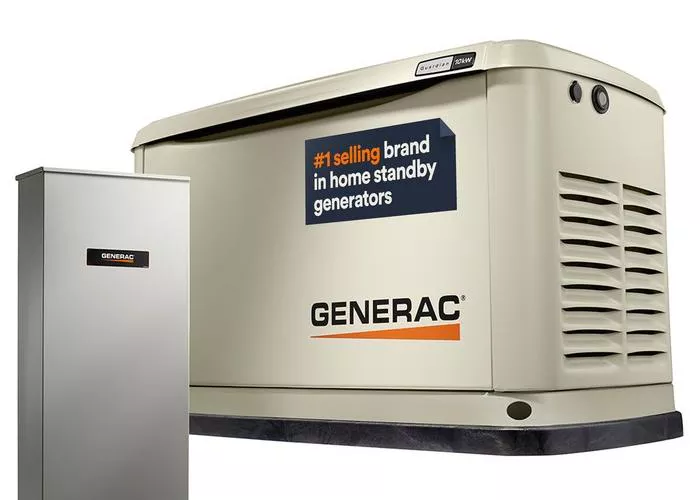A home generator is a backup power source designed to supply electricity during power outages. These generators ensure that essential household appliances and systems continue functioning when the main power grid fails. With an increasing reliance on electricity for daily life, home generators have become an indispensable solution for homeowners, particularly in areas prone to severe weather, blackouts, or unreliable utility power.
This article explores the working principles of home generators, their types, fuel sources, benefits, and considerations when choosing the right one.
How Home Generators Work
A home generator converts fuel energy into electrical energy using an internal combustion engine and an alternator. The basic working mechanism involves the following steps:
Fuel Combustion: The generator’s engine burns fuel (such as gasoline, diesel, natural gas, or propane) to produce mechanical energy.
Mechanical to Electrical Conversion: The mechanical energy drives an alternator, which converts it into electrical power.
Voltage Regulation: The generated electricity passes through a voltage regulator to ensure it matches the required output for home appliances.
Power Distribution: The generator is connected to the home’s electrical system either manually via extension cords or automatically through a transfer switch.
Shutdown or Continuation: Once main power is restored, the generator either automatically or manually shuts down, transferring power back to the grid.
Types of Home Generators
Home generators are broadly classified into two types based on their operational mechanism and size:
1. Portable Generators
Portable generators are compact, mobile units that provide temporary power. They require manual startup and connection to essential appliances or the home’s electrical system via extension cords or a transfer switch.
Features:
- Available in various power outputs, typically ranging from 1,000 to 10,000 watts.
- Powered by gasoline, propane, or diesel.
- Air-cooled engines with recoil or electric start options.
- Limited run time due to fuel capacity.
- Suitable for occasional or short-term power needs.
2. Standby Generators
Standby generators are permanently installed units that automatically activate when a power outage occurs. They are connected directly to the home’s electrical system and operate on natural gas or propane.
Features:
- Higher power output, typically ranging from 5,000 to 50,000 watts.
- Automatic transfer switch for seamless transition to backup power.
- Continuous operation as long as fuel supply is available.
- Requires professional installation and regular maintenance.
- Ideal for whole-house power backup, medical needs, or businesses.
Fuel Sources for Home Generators
The fuel type for a generator significantly impacts its performance, efficiency, and environmental impact. Common fuel sources include:
1. Gasoline
- Readily available and easy to use.
- Short shelf life and requires proper storage.
- Best for portable generators but unsuitable for long-term use.
2. Diesel
- Higher efficiency and longer lifespan than gasoline engines.
- Requires proper storage to prevent fuel degradation.
- Often used in larger standby generators.
3. Propane (LPG)
- Clean-burning and has an indefinite shelf life.
- Requires a storage tank for large quantities.
- Suitable for both portable and standby generators.
4. Natural Gas
- Continuous supply via municipal pipelines.
- Eliminates fuel storage concerns.
- Requires professional installation for standby generators.
Benefits of Home Generators
Investing in a home generator provides numerous advantages:
Uninterrupted Power Supply: Keeps essential appliances running during power outages, including refrigerators, heating systems, and medical equipment.
Increased Safety and Security: Ensures lighting and security systems remain operational, reducing risks during blackouts.
Prevents Financial Loss: Avoids food spoilage, water supply disruptions, and work interruptions for home-based businesses.
Convenience and Comfort: Maintains home heating or cooling systems, internet connectivity, and other daily conveniences.
Enhances Property Value: Standby generators can increase the resale value of a home.
Key Considerations When Choosing a Home Generator
Selecting the right home generator requires careful evaluation of several factors:
1. Power Requirements
- Calculate the total wattage of essential appliances and systems.
- Choose a generator with a power rating that meets or exceeds the required wattage.
2. Fuel Type and Availability
- Consider the most accessible and cost-effective fuel in your area.
- Evaluate storage and safety requirements for different fuel options.
3. Portability vs. Permanence
- Portable generators are ideal for occasional use and mobility.
- Standby generators offer seamless, automatic operation for continuous power backup.
4. Noise Levels
- Check decibel ratings to ensure compliance with local noise regulations.
- Inverter generators provide quieter operation compared to conventional models.
5. Installation and Maintenance
- Standby generators require professional installation and periodic servicing.
- Portable generators need manual refueling and storage space.
6. Budget and Cost
- Factor in the initial purchase price, fuel expenses, maintenance, and installation costs.
- Standby generators require a higher upfront investment but provide long-term benefits.
Safety Tips for Using Home Generators
To ensure safe and effective use of home generators, follow these best practices:
Proper Ventilation: Always operate generators outdoors to prevent carbon monoxide poisoning.
Correct Fuel Handling: Store fuel safely and refuel only when the generator is turned off and cool.
Regular Maintenance: Perform routine checks, oil changes, and battery inspections.
Safe Power Connections: Use heavy-duty extension cords and avoid overloading.
Automatic Transfer Switches: Ensure proper installation to prevent backfeeding into the power grid.
Conclusion
Home generators are valuable investments that provide emergency backup power during blackouts. Understanding their working principles, types, fuel sources, and selection criteria helps homeowners make informed decisions. Whether choosing a portable generator for occasional use or a standby generator for continuous power security, the right generator ensures comfort, safety, and convenience during unexpected outages.

